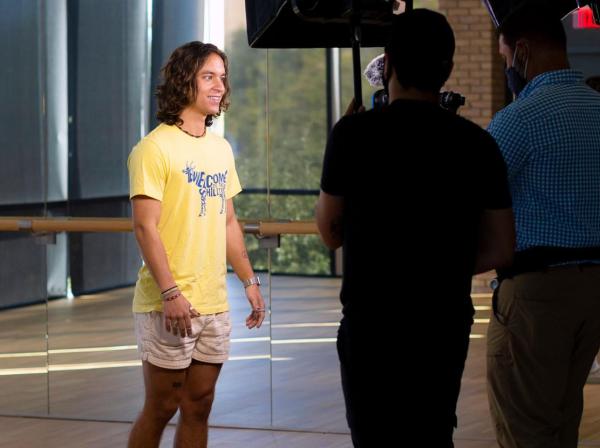Questions to Expect in Your First Professional Interview
Some questions are asked in virtually every interview, and you can compose better responses if you reflect on them in advance. This preparation can mean the difference between responding confidently during the interview and being caught like a deer in the headlights. Here are four of the most common interview questions. If you want help crafting your answers — or you’d like to practice them in a mock interview — the counselors in Career and Professional Development are here to help.
“Tell Us a Little About Yourself.”
Most interviews begin with this type of question, which is your chance to use your “elevator speech” — a 30-second introduction that gives some background information about who you are. “I’m graduating from St. Edward’s this semester, I’m a finance major, and I’m interested in applying for an entry-level financial analyst position in the Austin area to launch my career.” Your response should be short, but it should end with a version of, “this is why I’m here in front of you here today.”
“Give Me an Example of a Time When … ”
You will probably be asked some situational interview questions, which ask you to tell a story about a past experience. Some examples: “Describe a time when you found a creative solution to a problem.” “Describe an experience of failure, and what you learned from that failure.” It’s hard to anticipate exactly what you will be asked, so I recommend that you think of a few good stories in advance – a few “a-ha” or “uh-oh” moments from your life — and practice telling those stories in ways that relate to the core components of the job description. (For example, if you know teamwork is an important part of the position, find stories that illustrate your experience working in groups.) The employer is looking for what you learned from the situation — so you should explain, “while this group presentation didn’t work out as well as we’d hoped, here’s what I learned, and here’s what I’d do differently next time.”
“What Other Positions are You Applying For?”
There’s no need to pretend this position is the only one you’re applying for. The interviewer is trying to get a sense of your overall goals and trajectory. The way to answer this question is less by naming specific companies than by demonstrating your passion for this type of work, because the interviewer wants to hire someone with a natural enthusiasm for the position. You could say, “Being a financial analyst for this organization is what interests me most, but I’m also looking at some public finance positions.” Even though you might also be applying for something very different — say, Teach for America — you want to keep your story consistent so that you don’t seem unfocused. In this example, it would be better to leave Teach for America out of your response and focus on finance.
“What Questions Do You Have for Us?”
This is usually the last part of an interview, and it’s your chance to leave a good impression. The worst thing you could do is say that you don’t have any questions, because it suggests that you’re not very interested in the position. This is your chance to ask any questions about the company or job description that have come up during the interview. But you also should walk into the interview with at least two good questions you can ask at the end, that reinforce in the interviewer’s mind that you’re truly interested in the company. If you’ve done your research on the company, you can ask about something you learned: “I noticed that you’ve recently acquired a smaller company, and I wonder how that might change the business plan for this position?”
This isn’t the time for logistical questions about the start date, salary, or time off. None of that is relevant until you’ve been offered the job. It’s okay to ask about the hiring process: “I wonder if you could tell me about the hiring timeline from here on out, and what I should expect.” But don’t make that the only question you ask, because it doesn’t give you a chance to reinforce your interest in the position and the company.
Remember to Say Thank You
After the interview, be sure to thank the people you met. An email is almost always appropriate and is the fastest way to communicate: send your note of thanks by the end of the next business day. Try to personalize your note by referencing something specific to your interview — perhaps something you learned about the company. The purpose of the thank-you note, other than politeness, is to reiterate your continued interest in the position and the opportunity to work for this company.
By Raymond Rogers, former Director of Career and Professional Development, St. Edward’s University


